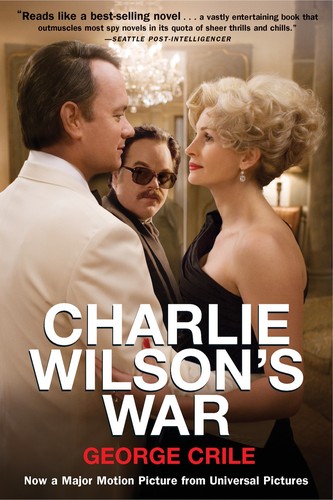Review: Charlie Wilson's War [★★★★☆]
Charlie Wilson's War
by George Crile
My rating: ★★★★☆
Read From: 27 February 2014 – 12 March 2014
Goal: Non-Fiction
This is a well-written book about a sequence of events that strains credulity. If I'd seen a movie or TV show that featured the events of this book as plot points, I'd attack the effort as contrived and unrealistic. Yet it apparently all happened. It's enough to further shake my already shaken faith in democracy.
Crile goes through great effort to portray Charlie Wilson as a lone wolf, pulling the strings of power to achieve his singular aim. That makes the book more interesting but I think it obscures the fact that a great many other people were involved in this conflict and very much wanted it to succeed. Charlie took a pre-existing conflict, already tepidly supported by the Congress and the White House, and pursued it with more creativity and vigor than anyone else could seemingly muster. He pushed his Congressional authority to the limits and beyond. In that sense, it was very much "Charlie Wilson's War". But he didn't single-handedly start or run the war.
The CIA was already involved in Afghanistan when he discovered the plight of the mujahideen. It's true that he sought extra funding for the effort and forced the CIA to step up its efforts. That extra funding, however, was voted on by the entire Defense Appropriations Subcommittee, the entire Appropriations Committee, and the entire Congress. Charlie was a likable Congressman with many friends and he was owed many legislative favors. But "his" war never would have happened if the other members of his committee, the Congress, or the White House had seriously opposed what he was doing. I think that the book errs by giving too much credit to Congressman Wilson and downplaying the support he had from others. It was otherwise engaging, horrifying, and educational.
Many people credit the downfall of the Soviet Union to its loss in Afghanistan. Many people also blame 9/11 and the rise in Islamic terrorism on America's training and equipping of the mujahideen. I'm prepared to believe that both are true. After reading this book, I'm left with many more questions than answers. Was the rise of terrorism inevitable and a necessary component of defeating the Soviet Union? Could we have prevented 9/11 by using more discretion about which tribal leaders to back? Was Charlie right or foolhardy to push for the escalation of America's involvement in Afghanistan?
Charlie Wilson's War illustrates the folly of believing that we can predict the effects of America's foreign policy moves. What seems right today may seem disastrous tomorrow. A certain humility would seem to be in order. You can read the book as a celebration of the American can-do spirit. I read it as a statement that we would be wise to pursue a foreign policy of non-intervention.
This entry was tagged. Book Review Review
